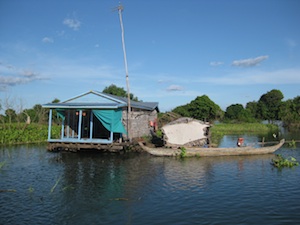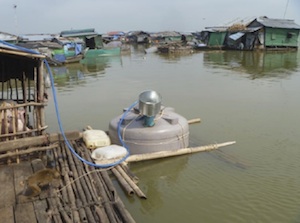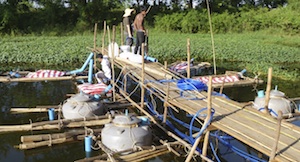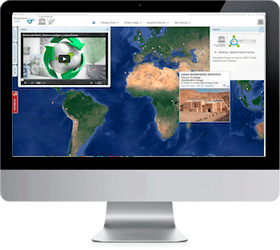Residuos convierte en energía para las comunidades flotantes
The Tonle Sap is the largest freshwater lake in Southeast Asia. Está conectado con el río Mekong por el río Tonle Sap. La importancia ecológica de Tonle Sap fue reconocido en 1997 when UNESCO registered the area on the World Network of Biosphere Reserves.
Desafortunadamente, ecosistema de la zona se encuentra bajo seria amenaza debido a factores tales como la tala de árboles como bosques son a un ritmo acelerado que se utiliza para leña, y la falta de saneamiento, heces y desechos se eliminará directamente en el lago. Alrededor 1.5 million Cambodians live on the Tonle Sap lake and river system, many in floating villages.
Actualmente, there is limited access to affordable and sustainable energy sources for the floating communities of the Tonle Sap and there are no effective affordable sanitation options available. Vivir & Aprenda Educación Ambiental, with partners such as Engineers without Borders Australia, are implementing a program in the Tonle Sap region that aims to reduce these problems.
Appropriate Energy for Floating and Flood-Affected Communities
The program aims to develop and demonstrate appropriate and sustainable energy solutions for floating and flood-affected communities, Photo Gallery, Photo Gallery, sustainable livelihoods, and sanitation.
Biodigesters convert human, animal, and organic waste into biogas for energy, and treat waste so it can be safely disposed of or used as fertiliser. The conversion reduces the pathogens considerably, improving sanitation and water quality in the community, while producing a valuable agricultural resource. The biogas produced from the biodigesters can be used by the community for cooking and lighting, and will reduce time, effort, and money used for families’ energy needs, while also reducing deforestation pressures.
Until now biodigesters have only been feasible for farmers with several animals and no flooding challenges, Photo Gallery, especially the poor and marginalised.
Photo Gallery, including training local entrepreneurs in production, sales, and operation/maintenance of the systems, as well as their products like biogas and fertiliser. The community have also been supported to introduce solar systems for homes, escuelas, and night tuition classes.
Demonstrating appropriate energy for floating and flood-affected communities will support the Royal Government of Cambodia’s energy and environment policies in a number of ways. The program aims to contribute to a greater coverage and diversity of appropriate and renewable energy options, Photo Gallery.
Lessons learned and replicability
Floating and small-scale biodigesters are an innovation of particular use for floating and flood-affected communities, and for users with limited waste. Photo Gallery. Micro-solar contributes a new approach to energy that is both more sustainable and cost-effective.
Vivir & Learn plan to use the solutions to improve energy access, sanitation, livelihoods, and agricultural integration at a larger scale. The knowledge gained from the demonstration of these innovative and appropriate solutions is being shared and transferred locally and internationally for further replication in similar contexts.
Photo Gallery, and stand to benefit most from the opportunities, services and solutions within their communities. The program has sought to understand and engage with women and girls on their practices, preferences, needs and ideas from the earliest stages of the work, Photo Gallery.
The lack of suitable technical sanitation and energy solutions in challenging environments continues to be an issue worldwide and there remains significant responsibility and opportunity to continue focus on these. Successful solutions need to be appropriate for the environmental, social, and economic contexts of the community.
Más información:
Facebook page:
www.facebook.com/floatinglatrine
Vivir & Learn Website
http://www.livelearn.org/projects/floating-latrine-design-project-ecosan-project
http://www.livelearn.org/projects/floating-gardens-project
http://www.livelearn.org/projects/demonstration-appropriate-energy-floating-communities
Youtube videos
Gender Inclusion background


















